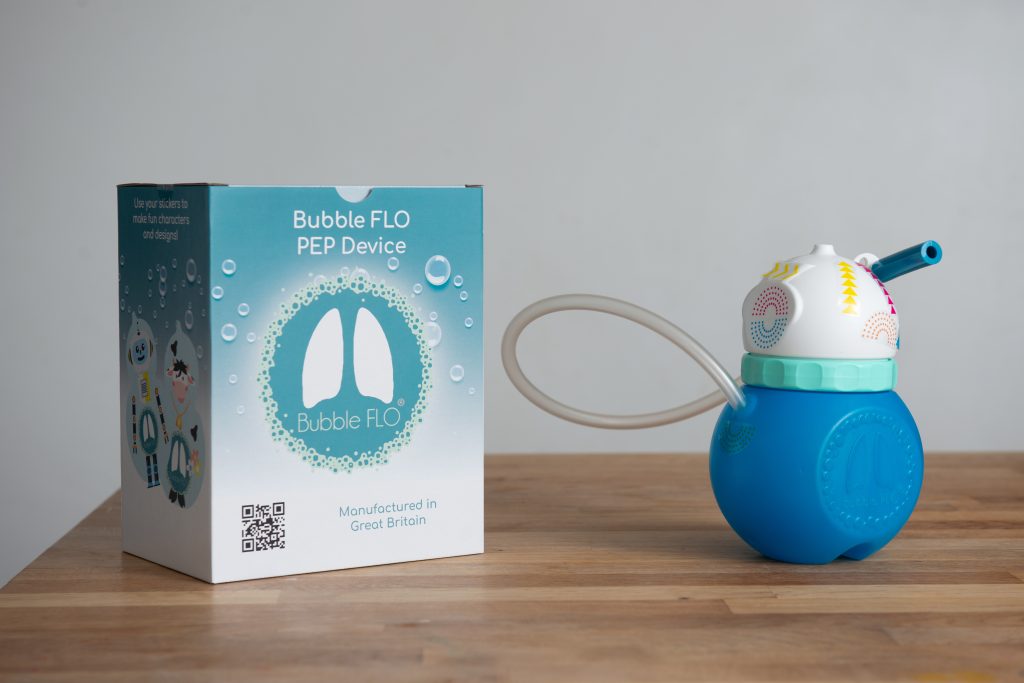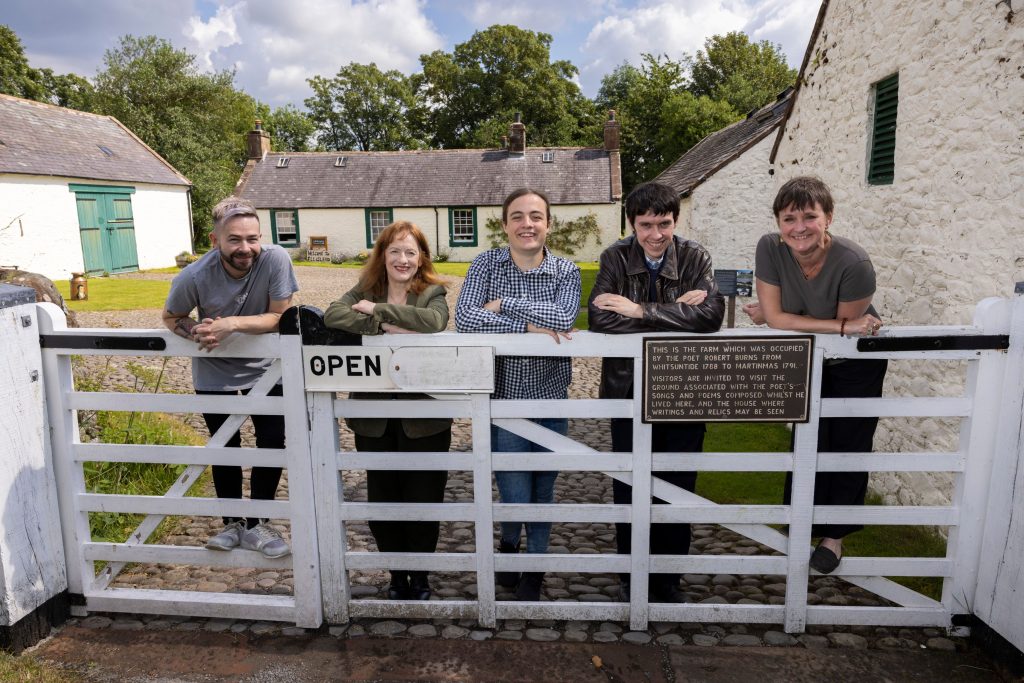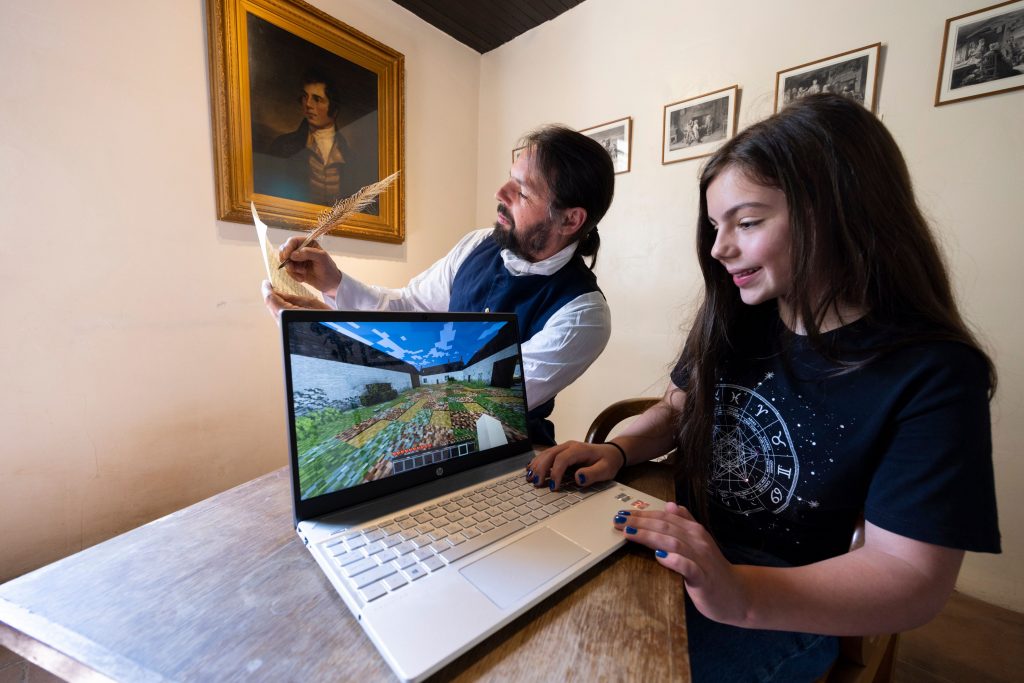Do you have an idea? Well, don’t let anyone steal it!
Attend this event by the AIMS Project in partnership with Dumfries and Galloway College, taking place at the STEM Hub, in the College, and hear from local businesses and public sector experts on how to protect your intellectual property.
Speakers include :
- Scott Davidson, Founder of Radisoft Ltd who has devised an IoT monitoring device and application for boilers.
- Katie Vance founder of Bubble Flow Ltd who has devised a non-sterile paediatric Positive Expiratory Pressure (PEP) device intended to assist children with lifelong respiratory conditions such as Cystic Fibrosis, Primary Ciliary Dyskinesia (PCD) and Bronchiectasis, to clear excess secretions from their lungs.
- Iain Barbour, JBA Seeds, Jamieson Brothers is Scotland’s best known brand of horticultural seed potatoes, garden supplies and animal feeds.
- Mari Findlay, Interface, who connect organisations to academics and will talk about Innovation Voucher Funding.
- Sarah-Jane Burns, Tech Scaler, Code Base – will talk about the technology programme and mentoring scheme
- Jamie Shovelin, D&G Chamber of Commerce – will talk about the business backed mentoring scheme
- Chris Rigby, South of Scotland Enterprise, SoSE, will be sharing some information from The Intellectual Property Office (IPO) who are the official UK government body responsible for intellectual property (IP) rights including patents, designs, trade marks and copyright.
- Paul Winstanley, CEO of Censis and Board Chair of Filament STAC, will be talking about the high applications in technology and PACE.
- Euan Devlin, Part Qualified Patent Attorney from Scintilla – will give an introduction into Patent, copyright, trademarks, trade secrets and design rights.
- Ross Colquhoun, Scottish Enterprise – will discuss the core elements of Scottish Enterprises SMART: SCOTLAND programme which can award up to £100,000 of support towards highly innovative R&D projects with strong commercial potential. Ross will also touch upon how this programme relates to your own intellectual property strategy.
This free event will take place at the STEM Hub, Dumfries and Galloway College, Bankend Road, Dumfries, DG1 4FD. Lunch and refreshments will be provided.
Mari Findlay of Interface is speaking on the day so come along and find out more about what Interface can offer.
The South of Scotland Destination Alliance Conference is the key annual gathering for tourism and hospitality in the South of Scotland.
The 2024 Conference will hold special significance as it will officially launch, and bring alive, the South of Scotland Responsible Tourism Strategy, which will underpin all work, by all agencies, over the coming decade 2024-2034.
Hear from Richard Lochead, Minister for Innovation, Tourism & Trade and inspirational speaker Bruce Fummey, Scottish comedian, tour guide and Burns aficionado.
The conference will explore through facilitated small group sessions and breakouts the four strands of the Responsibile Tourism Strategy to inspire visitors to come to the South of Scotland, to develop the visitor experience with a focus on quality, to support businesses to succeed and act responsibly for long term collective benefit.
For more information and to book your tickets go here.
Do you have an innovative product or service that could transform the dairy sector? Do you have technology that is transferable to dairy but need the right industry partner? Do you have an idea for a new dairy-based food or drink but need support and expertise?
The Digital Dairy Chain can help facilitate and fund all of the above and much more!
Join Digital Dairy Chain on Thursday 7th March in Dumfries for the opportunity to network with industry experts, find collaboration partners and hear directly from the businesses and people helped so far.
Everyone connected to or interested in working within the dairy supply chain is welcome.
A day to be informed, to network and collaborate!
Overview
Bubble FLO® has created a fun, child friendly, visually engaging, and effective physiotherapy medical device the Bubble FLO® PEP (Positive Expiratory Pressure) Device for the treatment of chronic lung conditions.
Background
Bubble FLO® was set up by Katie Vance to develop a child friendly, engaging and effective physiotherapy medical device- a Bubble Positive Expiratory Pressure (PEP) Device for the treatment of chronic lung conditions.
Positive-expiratory-pressure (PEP) therapy is a respiratory therapy that applies resistance to expiration, to produce positive airway pressure. Since the 1930s, PEP has been used to improve oxygenation, increase lung volume and reduce venous return in patients with congestive heart failure. PEP improves collateral ventilation, secretion clearance, aerosol distribution and functional residual capacity. (Respiratory Care:April 2009, Vol 54, No.4)
Challenge
The idea of creating a Bubble PEP device evolved when Katie’s daughter was diagnosed with a lifelong respiratory condition and the equipment supplied to carry out vital twice daily physiotherapy was very basic and lacked visual engagement for children. Katie discovered there was no specific Paediatric equipment available, so she decided to develop a Bubble PEP Device which was fun, engaging and effective in clearing secretions from the lungs, and that was aesthetically pleasing, easily portable and easy to empty and re-fill.
The technology did not exist to meet these key practical needs and Katie recognised that such a product could be revolutionary in this critical field. The prototype that she developed was given very positive feedback from physiotherapists who worked with Katie’s daughter, and they expressed a need for a similar device for use by other patients and so Bubble FLO® was born.

Solution
To develop the concept Katie contacted Interface, who, after putting out a search to Scotland’s universities and research institutes, partnered her with Kath Sharp, NHS Team Lead in Paediatric physiotherapy at Glasgow Caledonian University, (who introduced the technique to the West of Scotland and acted as a consultant on the project), and Professor Terence Gourlay, from the University of Strathclyde’s Biomedical Engineering Department, who has extensive experience in the design, development and commercialisation of medical devices.
This collaborative project, funded by a Scottish Funding Council Innovation Voucher, focused on the development of a novel respiratory improvement technology aimed at the paediatric sector, but based on known and well-established approaches. The novelty in the proposed approach is centred around making what can be a tiresome therapy for children, fun and engaging.
The experience the Department of Biomedical Engineering has in the production of laboratory, test-ready prototype devices was applied to the project to produce near clinically deliverable prototypes of the proposed technology which were then successfully tested under laboratory conditions.
Subsequently Bubble FLO® was awarded a By Design Grant from Scottish Enterprise, which allowed the prototype design and ergonomics to be developed further.
Through the support of South of Scotland Enterprise, Bubble FLO® worked with an engineer to develop manufacturing tools, create 40 prototypes and completed bio burden and chemical compatibility testing.
Regulatory work has been completed with the support of CPI and Innovate UK to ensure the product is suitable for use.
BubbleFLO are hoping to start clinical trials with the West of Scotland Innovation Hub at the Royal Hospital for Children in Glasgow soon.
Interface have continued to assist Bubble FLO® brokering collaborations with the University of Strathclyde to create a brand and marketing strategy to target families of children with respiratory conditions and with Edinburgh Napier University to develop a “How to Set Up and Use” animated video with the aim of using animated characters to turn what can be a very daunting experience for a child into a fun and engaging one.
Benefits
As the Bubble FLO® PEP Device will be more engaging for children than the current NHS equipment; children will be much more motivated to carry out effective physiotherapy sessions and, in turn, this has the potential to save the NHS budget considerably through a reduction in hospital admissions for respiratory treatment.
Whilst initially, sales of the Bubble FLO® PEP Device will be to parents online, it is hoped the NHS will purchase this new medical equipment as a long-term investment to reduce their overall budget after completion of an upcoming clinical trial with the West of Scotland Innovation Hub, Royal Hospital for Children in Glasgow.
The development of the proposed technology will underpin the foundation of the commercial activity around this novel product. The company have benefitted from the University’s expertise in the development of prototypes, their laboratory evaluation and expertise in tooling design and production of the medical devices.
Subsequent collaborations have provided Bubble FLO® with a marketing and targeting strategy and produced a novel animated guide for children and parents to be able to use the device at home.
The academic partner has benefitted through this new research activity in the paediatric respiratory sector and in the use of this project as a case study for teaching purposes. In addition, the project fits very well with the Department’s objective of being supportive of the Scottish life science and med tech sectors.
This project was nominated for Innovator of the Year at the Scottish Knowledge Exchange Awards and won a Wild Card at the Scottish EDGE.
Sign up for a day of inspiration, insights, learning and networking. Supply chain resilience, industry 4.0 technologies, leadership & culture, operational excellence and sustainability will all be covered. Find out how the manufacturing sector responded to a global pandemic, how it can recover and how we will reimagine the future.
The conference, previously known as the Scottish Manufacturing Advisory Service (SMAS) National Manufacturing Conference, will arm manufacturing sector and supply chain businesses with the ambition, vision, knowledge, tools and networks to increase productivity and maintain future competitiveness.
Making Scotland’s Future is a partnership between Scottish Government, public agencies, industry and academia that are collectively taking forward a programme of activity designed to secure a strong, sustainable future for Scotland’s manufacturing sector, aligned to the Scottish Government’s ambitions in the National Strategy for Economic Transformation. The power of Making Scotland’s Future lies in harnessing all of its collective networks, channels and support to help drive productivity, innovation and competitiveness, maintain and create high-quality jobs, and attract and develop talent, while embedding low carbon and sustainable manufacturing as its core. The vision is for Scotland to be a country inventing, designing, developing and manufacturing world-leading products and technologies. Through continuing support and investment, we are making Scotland’s future today.
The Making Scotland’s Future Conference is being led by Scottish Enterprise on behalf of the Making Scotland’s Future partnership.
Interface are exhibiting and we’d love to see you there!
With the world being in constant change over the last few years with the pandemic, geopolitical events and climate change is it time to take stock and build some resilience into your business? See what challenges can be turned into opportunities, and allow you to grow and prosper?
Join this event to hear about where the Dairy industry is at currently and heading, what the Digital Dairy Chain can do to support you, where technology is taking us and what expertise and funding is available.
Everyone connected to the Dairy supply chain is welcome; from farmers, to milk processors, cheesemakers, ice-cream manufacturers, agricultural suppliers, hauliers and technology businesses.
A day to be informed, to network and collaborate.
This event will give you the opportunity to explore the AIMS (Advancing Innovative Manufacturing in the South of Scotland) project facilities and meet the engineers that maintain and operate the advanced manufacturing capabilities available. You will also hear from Interface and the Defence and Security Accelerator – DASA who may be able to fund projects involving the AIMS facilities.
Refreshments and networking opportunities will be provided.
Advancing Innovative Manufacturing in the South of Scotland (AIMS) Project
The AIMS Project (Advancing Innovative Manufacturing in the South of Scotland) is primarily there to benefit SMEs. The use of the AIMS equipment and expertise is free of charge. Incorporating state-of-the-art equipment and technologies, we provide SME’s access to advanced manufacturing, business support and industry-led expertise, assisting businesses to:
• Innovate, develop, prove, and introduce new processes in product manufacturing
• Introduce businesses to new technology and innovate ways of manufacturing
• Turn their ideas into reality without the cost of R&D
Recent collaborations have resulted in assisting clients with introducing new products, automating processes and reverse engineering. We have a range of equipment available at our group of innovation facilities based at Dumfries & Galloway College (Dumfries Campus), The Bridge (Dumfries) and Borders College (Hawick Campus).
Rabbie Burns goes virtual – Robert Burns Ellisland Farm recreated in Minecraft highlighting the life and great works of the National Bard.
Ellisland Museum & Farm was the farmhouse built by Robert Burns, Scotland’s National Bard in 1788. It was his home, where he farmed, and where he worked as an Excise officer. Today Ellisland is a much-celebrated museum housing one of the world’s most important collections of Burns treasures.
Background
Ellisland Museum & Farm near Dumfries was the farmhouse built by Robert Burns and was his home until 1791 where he farmed and worked as an Excise officer. During his time living there he experienced his most creative and fruitful years in terms of his poetry and song. This is where he wrote Tam O’Shanter and Auld Lang Syne. Today Ellisland is a much-celebrated museum housing one of the world’s most important collections of Burns treasures.

The Challenge
During 2020/21 Covid-19 saw visitor numbers drop dramatically and visitor attractions closing their doors for a significantly long period, some of them indefinitely. The main challenge during this time was how to maintain interest, widen reach and encourage visitors to return.
The Ellisland Trust, who run the Ellisland Museum & Farm wanted to develop an interactive Robert Burns Minecraft digital experience appealing to a younger audience to highlight the life and great works of the National Bard. Their idea was to depict his life as an Excise Officer and farmer as well as highlighting his poems and songs and other Burns associated landmarks in Dumfries and Ayrshire.
The Solution
Ellisland Farm, where Burns lived from 1788-1791, has been brought back to virtual life in Minecraft.
Students and academics at the University of Glasgow worked with the Robert Burns Ellisland Trust to faithfully recreate, in Minecraft, the 18th-century farm as Burns and his family knew it.
The Minecraft Ellisland world was built by around 15 students – undergraduates and postgraduates drawn from a range of different subjects – who are part of the University’s Minecraft Society.
Bailey Hodgson, the Minecraft Society’s President and one of its founders, who has been using Minecraft for 12 years, played a significant role both in project setup and delivery.
The Minecraft Ellisland project was led by Dr Timothy Peacock and Dr Matthew Barr from the University’s Game and Gaming Lab, a cross-disciplinary lab – based in the University’s College of Arts – with a focus on how games and gaming can be used in research and teaching.
Interface were able to find an academic partner at very short notice to tie in with funding from South of Scotland Destination Alliance (SSDA) and made the relevant introductions between the University of Glasgow, SSDA and Ellisland Trust.
The project was funded through SSDA from the Scottish Government’s Tourism Leadership & Recovery Fund which supports tourism enterprises taking the lead in the sector’s COVID-19 recovery.

The Benefits
- The Robert Burns Minecraft experience is an innovative use of gaming technology to reach a wider, younger audience. Engaging young people with Robert Burns in a modern, appealing way will help to raise the profile of his work and lead to an increase in visitors to the Ellisland Farm and other associated Robert Burns visitor attractions in and around Dumfries and Ayrshire.
- Players have an opportunity to not only hear Burns’ poetry and song while in the Minecraft world but are also able to converse in Scots with the poet and his wife Jean Armour. It is believed to be the first time Scots has been spoken on Minecraft, which has nearly 140 million monthly active users around the world.
- The Burns Minecraft experience has widened the reach and appeal of Robert Burns, his life and works, attracted a younger demographic and helped the Ellisland Museum and Farm thrive and survive post Covid-19.
Venue: APEX City Quay Hotel, Dundee
The Scottish Knowledge Exchange Awards, sponsored by Salix Finance, is the flagship event that celebrates the partnerships between business, third sector or public sector organisations and academia. Now in its eighth year the annual event recognises, rewards, and celebrates the impacts achieved through these exciting collaborations that enrich society and support sustainable and inclusive economic growth.
To discover more about the categories, and how to apply visit our recent article. Read More.